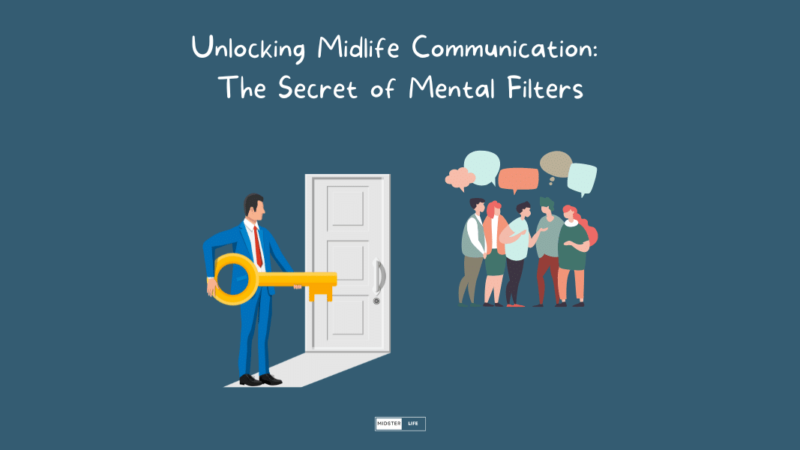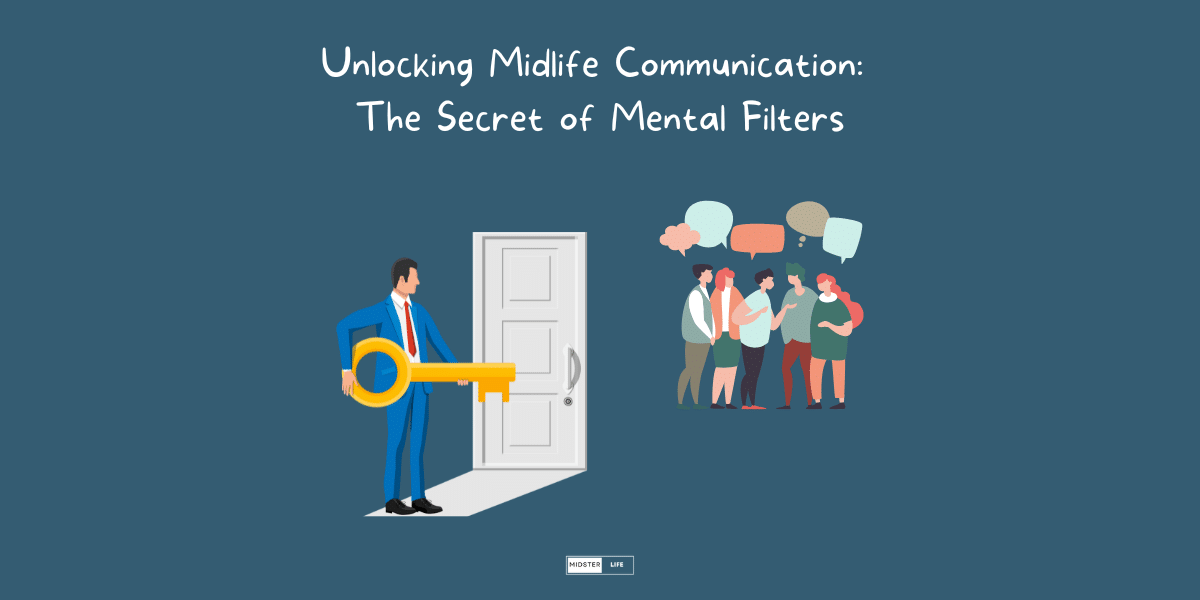Unlocking Midlife Communication: The Secret of Mental Filters
Life has a funny way of teaching us lessons, and one of the most profound is that our perception shapes our reality. It’s in our 40s that we begin to appreciate this wisdom fully. In this insightful blog post, we’ll dive into the world of mental filters—those nifty little mechanisms that color our interpretations and responses. Whether it’s about grasping the nuances of a loved one’s thoughts or making sense of a new career opportunity, understanding mental filters can take your midlife communication skills to the next level.
Understanding Midlife Communication: A World Of Diverse Perspectives
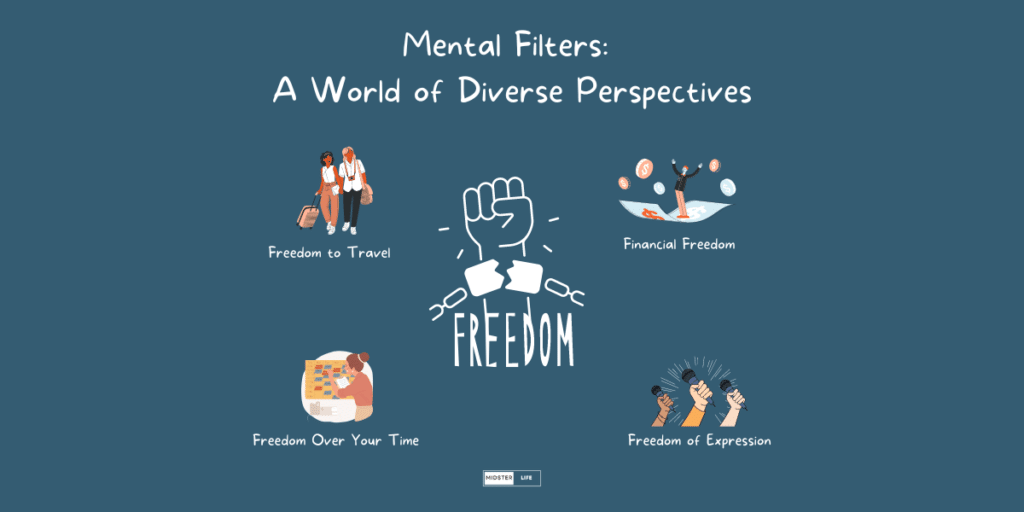
The starting point for improving how we communicate is to accept that each of us perceives the world differently, leading to unique interpretations of the same information. For instance, think about the word ‘freedom.’ For some, it signifies the ability to travel the world without any constraints. In contrast, for others, it represents the financial independence to make their own choices. For others, ‘freedom’ means the flexibility to manage their time and work schedules. These differences underscore individual perceptions and highlight the importance of understanding others’ viewpoints.
The Role of Our Beliefs in Midlife Communication
When we receive information from the world around us, we process it through various mental filters.
The first of these is our beliefs. We are unique and hold unique beliefs formed over our life experiences.
As we receive information, we process it through our belief system, which will generate decisions and actions for us. Because our beliefs are unique from others, our decisions and actions will be different despite the same core information input.
Belief systems in action
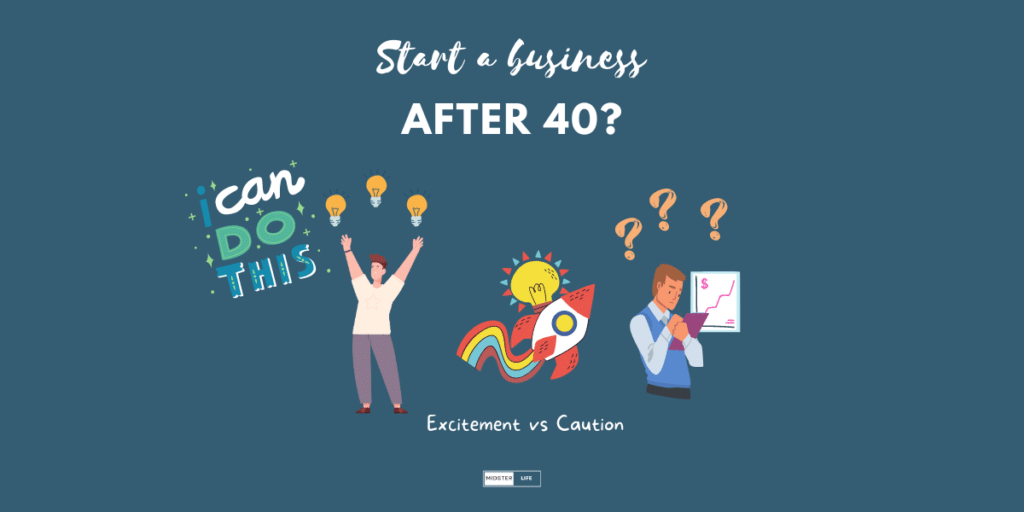
Consider the notion of ‘starting a business in your 40s.’ Our personal beliefs can dramatically influence how we interpret this idea. One person might view ‘starting a business in your 40s’ as an exciting new chapter, a chance to harness their accrued skills and experiences into a passion project, empowered by the belief that age is no barrier to innovation.
Conversely, another person might perceive ‘starting a business in your 40s’ as a risky, potentially destabilizing venture, informed by a belief in the importance of financial security and a predictable routine at this life stage.
Why understanding others’ belief systems is essential.
This is important to understand because to effectively communicate, it is vital to understand everyone has a unique perspective based on their belief filters. We need to take the time to understand their perspective better and adapt our communication style to meet them.
The Role of Values in Midlife Communication
Values are another critical filter shaping our perception. These values dictate our perspectives and actions, whether health, family, money, freedom, flexibility, or peace of mind. For instance, a person valuing security may prefer a full-time job and minimize risks. In contrast, someone who values freedom might resist restricted work hours and a lack of autonomy. Therefore, adjusting our communication style to match the values of our conversation partners is crucial. You can uncover these values by asking, “What is important to you?”. Understanding values isn’t about manipulation but about presenting facts and arguments that resonate with the individual’s values.
The Role of Mental Filters in Midlife Communication
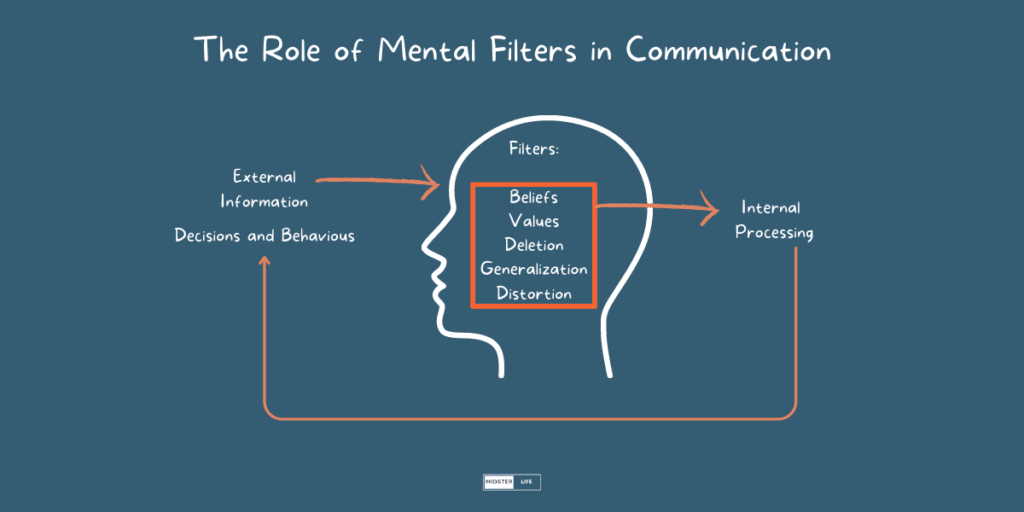
As we receive information, we process it through three primary mental filters: deletion, where we ignore unimportant information; generalization, where our brain uses past experiences to make decisions; and distortion, where we perceive opportunities as better or worse than they are. Recognizing these filters can help identify how someone is processing information during communication.
Let’s dive into mental filters – they’re like the secret agents of our minds, working behind the scenes while we go about our daily lives. They’re the real decision-makers in how we see the world. Pretty cool, right?
Deletion
Okay, so the first agent is known as deletion. Imagine you’re at a party with many people chattering, music playing, dishes clattering – a complete sensory overload. Your brain can’t possibly process everything, so it chooses what you need to focus on. Maybe it’s your friend’s hilarious story or the delicious smell wafting from the kitchen. Everything else? Deleted. It’s like your brain’s own Marie Kondo, tidying up your sensory input.
Generalization
Next up, we have generalization. Ever had a bad experience and thought, “Well, that’s always going to stink?” That’s your brain drawing broad conclusions from a single incident. It’s like eating a bad apple and deciding all apples are rotten. Handy sometimes, but it can lead to some off-the-mark assumptions.
Distortion
Finally, we’ve got distortion. This filter is like that friend who always sees the bright side, no matter what. Or, conversely, that cousin who can find a cloud in every silver lining. We see things not as they are but as we are. Our perceptions can be like those fun-house mirrors, stretching or shrinking reality to fit our worldview.
Why are these processes important for Midlife Communication?
You might think, “Great, my brain’s a deletion-happy, generalizing, reality-distorting machine – so what?” Understanding these mental filters allows you to see things from other people’s perspectives. And that can help you improve your communication skills and develop strategies to enhance how you communicate with others.
Remember, it’s never too late for a change. And understanding these mental filters might be the ticket to a whole new you. So, grab a coffee, sit back, and take a moment to ponder these secret agents of your mind. Who knows? You might even chuckle, realizing how your brain’s been running the show.

